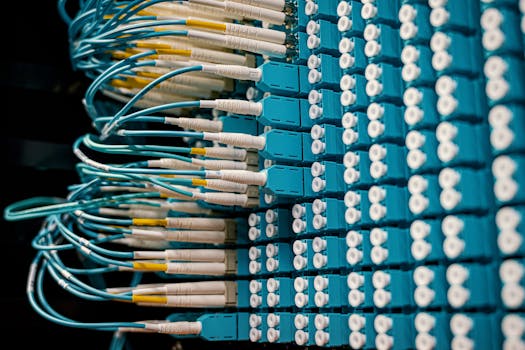
5G: The Future of Internet Speed, Explained
The world is rapidly moving towards a hyper-connected future, and at the forefront of this revolution stands 5G technology. 5G, short for fifth-generation wireless technology, is the successor to 4G, promising significantly faster speeds, lower latency, and a massive increase in network capacity. But what exactly does this mean for the average user, and how will it impact our daily lives?
Understanding the Benefits of 5G:
- Blazing-fast speeds: 5G networks are designed to offer download speeds up to 10 times faster than 4G, with theoretical maximums reaching up to 20 Gbps. This means lightning-fast downloads, seamless streaming, and virtually lag-free online gaming. Imagine downloading a full-length HD movie in mere seconds, or playing online games with zero noticeable delay.
- Reduced Latency: Latency, the time it takes for data to travel between your device and the network, is a critical factor for real-time applications. 5G significantly reduces latency, reaching milliseconds, making it ideal for applications like virtual reality (VR), augmented reality (AR), and remote surgery. Imagine experiencing immersive VR experiences without any lag or experiencing seamless real-time communication across vast distances.
- Increased Capacity: 5G networks can handle a massive increase in the number of connected devices without compromising speed or performance. This is crucial in a world where the number of connected devices, from smartphones to smart appliances, is rapidly growing.
- More Reliable Connections: 5G offers a more reliable connection compared to 4G, particularly in crowded areas or during peak hours. This means fewer dropped calls, smoother video chats, and consistent performance even in high-traffic environments.
Beyond Speed: How 5G is Transforming Industries:
The benefits of 5G extend far beyond faster internet speeds, impacting a wide range of industries and shaping the future of our world:
- Industry 4.0: 5G is revolutionizing manufacturing processes, enabling real-time data collection, predictive maintenance, and automated systems. Think of factories where robots collaborate seamlessly, machines self-diagnose issues, and production lines operate with unprecedented efficiency.
- Smart Cities: 5G enables smart city infrastructure, connecting traffic lights, sensors, and smart grids to optimize traffic flow, manage energy consumption, and improve public safety. Imagine cities with self-driving cars navigating seamlessly, traffic lights adapting to real-time conditions, and efficient energy distribution minimizing waste.
- Healthcare: 5G facilitates remote surgery, telemedicine, and real-time health monitoring, connecting patients with doctors and allowing for quicker and more accurate diagnoses. Imagine receiving medical care in remote locations, having surgeons perform surgeries remotely, and wearable devices constantly monitoring your health and providing instant alerts.
- Education: 5G allows for immersive virtual classrooms, personalized learning experiences, and remote access to high-quality educational resources. Imagine students learning from anywhere in the world, accessing interactive simulations and virtual labs, and receiving customized instruction tailored to their individual needs.
- Entertainment: 5G unlocks a new world of entertainment possibilities, enabling high-quality VR/AR experiences, interactive gaming, and live streaming with unprecedented clarity. Imagine participating in immersive VR games, experiencing live concerts from the comfort of your home, and interacting with virtual worlds seamlessly.
The Challenges of 5G Deployment:
While 5G promises a world of possibilities, its rollout faces several challenges:
- Infrastructure Costs: Building a robust 5G network requires significant investment in new infrastructure, including cell towers, antennas, and fiber optic cables. This can be costly for telecom companies, potentially delaying widespread 5G adoption.
- Spectrum Availability: 5G operates on higher frequency bands, requiring more spectrum than previous generations. Government regulations and spectrum auctions can be complex, delaying network deployment.
- Device Compatibility: 5G devices are currently limited to certain high-end smartphones and laptops. Wider adoption requires the development and availability of affordable 5G-enabled devices across various categories.
- Security Concerns: As 5G networks become more critical to our daily lives, ensuring their security is paramount. Cyberattacks and data breaches pose significant risks, requiring robust security measures and ongoing vigilance.
The Future of 5G:
Despite the challenges, 5G is rapidly expanding across the globe. As networks mature and devices become more readily available, the impact of 5G on our lives will become increasingly significant. From faster internet speeds to revolutionizing industries and transforming our daily routines, 5G is shaping the future of technology and the world we live in.
In conclusion, 5G represents a paradigm shift in wireless technology, offering faster speeds, lower latency, and increased capacity. While the rollout may face challenges, the potential impact of 5G is undeniable, promising to revolutionize industries, enhance our daily lives, and unlock a world of possibilities.
[Object Object]
In addition to the above:
The 5G spectrum is being allocated in different ways across the globe. Some countries are using a "standalone" approach, where 5G networks are built from scratch on a dedicated spectrum. Other countries are using a "non-standalone" approach, where 5G is integrated into existing 4G networks. This has implications for speed and coverage, with standalone networks generally offering higher performance but requiring more investment.
The 5G ecosystem is constantly evolving. New technologies are being developed that can further enhance the capabilities of 5G, such as edge computing and network slicing. This will lead to even faster speeds, lower latency, and more advanced applications.
The impact of 5G goes beyond speed. It also has the potential to create new jobs, boost economic growth, and improve social equity.
5G is not a replacement for fiber optic internet. Fiber optic internet offers the highest speeds and lowest latency, but it is not available in many areas. 5G provides a viable alternative in areas where fiber optic infrastructure is limited.
[Object Object]
This article is just the beginning of the story of 5G. As the technology continues to develop and mature, its impact on our lives will only become more pronounced.

Posting Komentar